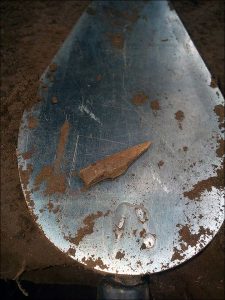Archaeologists unearthed remains of a meal, dating back 8000 years to the Mesolithic era, at the Mukhatta site, at the middle course of the Lena river, Yakutia region of The Russian Federation.

The findings consist of skeletons of three fish of different size, and four floats or bobbers – presumably used with nets for the catch – made from rolled birch bark. All of the remains are said to be in excellent state of preservation after 8000 years. It is believed that they form a prepared meal intended to be eaten by fisherman of the ancient Sumnagin people who lived in the area between Taimyr and Chukotka in the period from 10000 to 6000 BC. Archaeologists also discovered a harpoon head within the same layer.

Radiocarbon analysis links the fish supper to the Sumnaginskaya culture and are believed to be around 8000 years old. They were the first people to move North and populate the Siberia’s Arctic tundra. Archaeologists believe the Sumnagin people were interrupted while preparing a meal and never finished eating it. Three fish, lying on top of each other have been found. Judging from the size of the spine joins, one of the fish had to be a quite large specimen, as its vertebra measures some 1 centimetre in diameter.

(after Siberian Times & Victor Dyakonov)